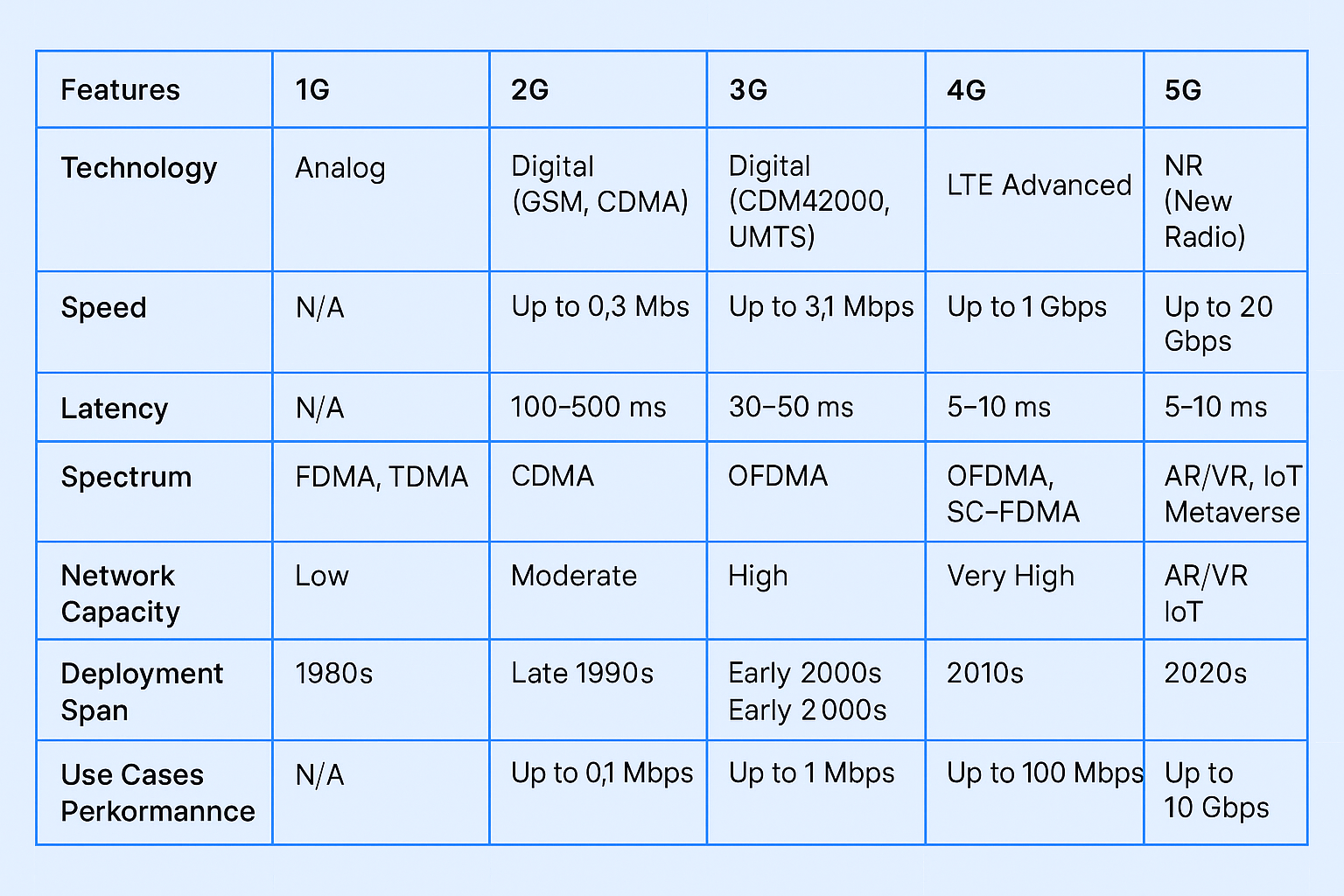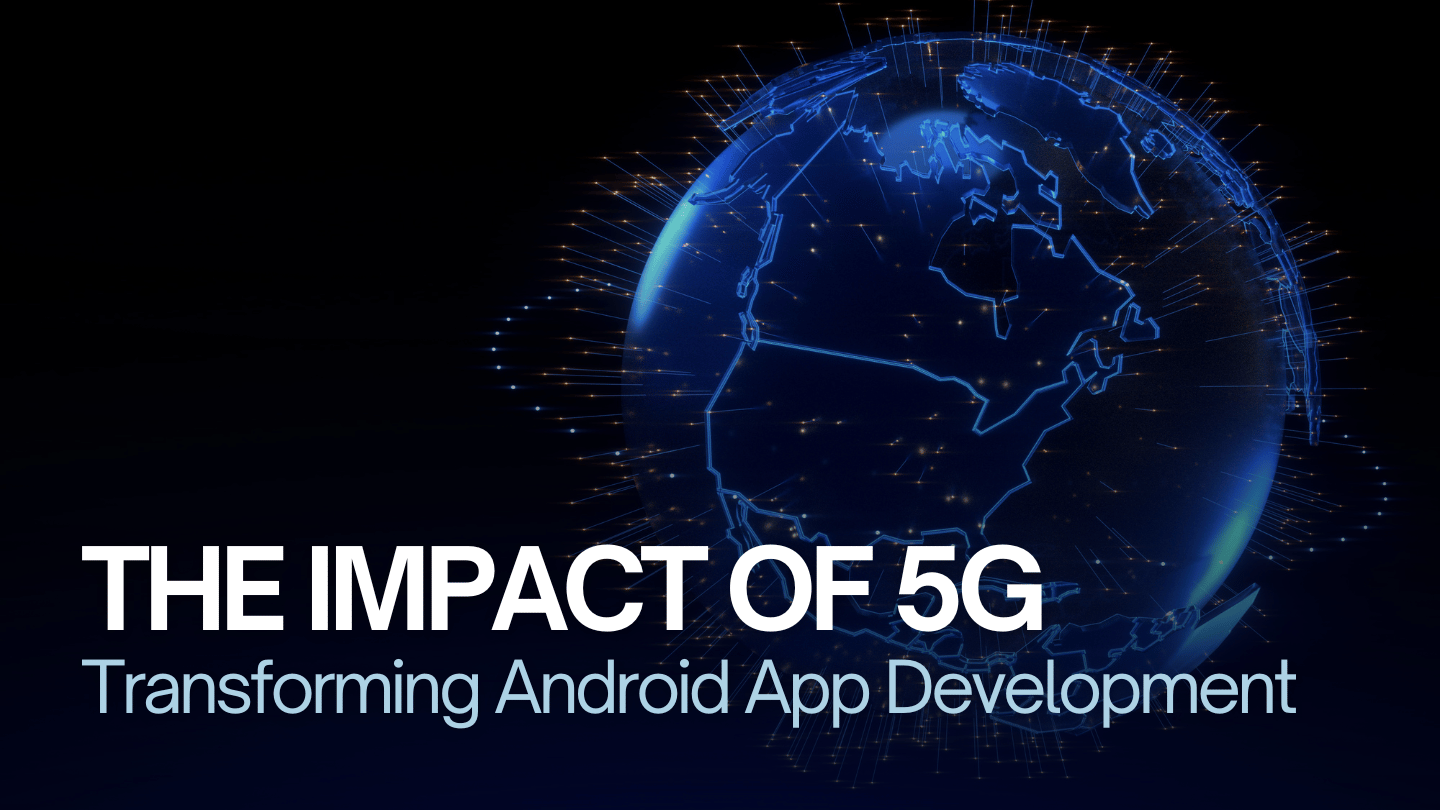Mobile networks have always been a big deal for app developers. Moving from 3G to 4G was exciting, but now 5G is here in 2024-2025, and it's changing everything about how we make apps.
5G has created quite a buzz in the Android development world. It's completely changing how users interact with mobile apps by offering super-fast internet and almost no delay. Developers are jumping at this chance to create new and exciting experiences for their users.
The impact on Android app development is huge. Developers can now build much more feature-rich and dynamic applications. From smooth HD video streaming to lag-free multiplayer games, practically everything we do on our smartphones is getting a major upgrade with 5G.
We're hoping this innovation will spark a whole new generation of Android apps that make the most of what 5G networks can offer.
How 5G is different from 4G
The jump from 4G to 5G isn't just about faster speeds—it's a complete overhaul of what's possible in the mobile world. 5G is opening up new possibilities for app development that go way beyond just speed or connectivity.
This technology is bringing unprecedented speed, reliability, and game-changing capabilities. It's transforming everything from AR and VR experiences to smart city applications and IoT innovations. Whether you're a business owner, entrepreneur, or developer wanting to get started in the 5G era, you need to be ready to embrace these changes while understanding the technical details, security concerns, and other important factors.
What makes 5G technology better
As people rely more and more on mobile apps for work, entertainment, and daily tasks, 5G is becoming increasingly important. Let's look at what makes 5G different:
Faster speed: 5G offers download speeds up to 20 Gbps and upload speeds up to 10 Gbps—about 10 times faster than previous wireless technologies.
Lower latency: 5G has ultra-low latency of just one millisecond, enabling real-time communication and boosting performance for gaming and video conferencing.
Increased bandwidth: 5G can support many devices and applications without slowing down. It can also operate on higher frequency bands.
MIMO technology: 5G uses Multiple Input Multiple Output technology, which allows multiple signals to be sent and received at once, expanding data speeds and improving network performance.
Network slicing: 5G divides the network into smaller virtual networks, each isolated end-to-end and customized for specific applications and services.
Beamforming: This important 5G feature directs signal transmissions using sharp, focused beams to specific locations or devices.
Better battery life: 5G is more energy-efficient than previous wireless technologies, helping to improve battery life for connected devices.
Enabling new technologies: 5G is a crucial enabler for emerging technologies, improving both business applications and other digital experiences.
Comparing 1G through 5G networks

Here's how 5G stacks up against previous generations of mobile networks. Keep in mind that actual speed, latency, and performance can vary based on network connectivity:
This is why developers now prefer 5G for building custom mobile apps with advanced features and functions.
Benefits 5G brings to app developers
So what difference does 5G really make for mobile app development? Is it just about making faster apps, or does 5G offer something more? Let's explore the opportunities for high-speed mobile app development:
Faster apps with better performance
Android developers can now create apps that take advantage of 5G's amazing speed and reduced delay. Content loads in milliseconds, delivering smoother and more seamless experiences. Whether it's buffer-free HD video streaming or super-fast downloads of large files, the experience is incredible.
Imagine creating multiplayer games without lag, or experiencing instant responsiveness in augmented reality apps. 5G makes it all possible. These improvements open exciting new possibilities for user experiences that Android app development companies can provide.
Recent surveys show that 5G deployment will contribute $1.4-1.7 trillion to the US GDP and create 3.8-4.6 million jobs in the next decade.
More engaging user experience
Thanks to 5G's low latency, Android developers can create apps that respond to user actions instantly, giving users an engaging and immersive experience. Whether swiping through photos, navigating maps, or performing other tasks, users will notice improved responsiveness.
This boosts engagement and satisfaction, resulting in longer app usage times and better business outcomes for app development companies. By prioritizing user engagement and making the most of 5G capabilities, companies can stay ahead of the competition and build apps that users love.
Connecting with IoT devices
5G provides the perfect platform for integrating IoT devices into Android applications. With high bandwidth and low latency, 5G enables real-time communication between devices, allowing for smarter and more responsive IoT solutions.
Imagine controlling smart home devices from your Android phone with instant response times, or receiving real-time health data from wearable devices for personalized fitness apps. The possibilities for IoT integration are endless, and companies that adopt this technology will gain a competitive edge.
Processing data closer to users
Android app developers are using 5G's edge computing capabilities to optimize app performance and deliver smoother user experiences. By offloading computational tasks to edge servers near the end-user, applications can achieve lower latency and improved response time. This means apps load faster, with smoother animations and a snappier interface.
Edge computing can also reduce bandwidth usage and extend battery life, making apps more efficient and sustainable. By incorporating edge computing into their development process, app companies can create apps that perform better, use fewer resources, and provide a superior user experience.
Problems app developers face with 5G
Like any new technology, 5G brings both excitement and challenges. App development companies believe it will multiply bandwidth usage, adding complexity to development. Here are some challenges you might face when developing for 5G:
Different 5G networks in different places
5G brings fast connectivity but also challenges like network fragmentation. Different regions and carriers adopt different 5G standards, leading to variations in coverage and compatibility. Android developers must ensure their apps work across various 5G networks to reach users effectively.
This requires thorough testing and optimization to address network-specific issues and ensure a seamless user experience regardless of location or network provider. Developers may also need to implement fallback mechanisms for situations where 5G is unavailable, ensuring uninterrupted app functionality for all users.
Users will use more data
Faster 5G speeds mean users may consume more data, posing a challenge for app developers. To address this, developers must use innovative techniques to optimize apps and minimize data usage, such as data compression and intelligent caching. This ensures a cost-effective and data-friendly experience for users.
Developers can also add features like data usage tracking and settings that let users manage their consumption to avoid overage charges. Companies that prioritize data efficiency will reach more users and improve satisfaction.
Studies show that the percentage of devices with 5G capability rose from 56% in 2021 to 77% in 2023.
Not all phones support 5G yet
Not all Android devices support 5G, creating compatibility challenges for app developers. They must ensure apps work well on both 5G-enabled and older devices without compromising functionality or performance. Adapting apps to transition smoothly between network technologies is important for reaching a wider audience.
Developers must stay updated on the latest device releases and network advancements to ensure their apps remain compatible with the evolving Android ecosystem. By prioritizing compatibility and backward compatibility, companies can maximize their reach and user base.
More technical knowledge needed
The introduction of 5G adds complexity to Android app development. It requires developers to understand technical aspects and integrate relevant protocols and APIs. This demands specialized knowledge and expertise in 5G technologies, potentially requiring additional training and resources.
Developers may also face challenges in optimizing app performance for varying network conditions and efficiently managing data transmission over 5G networks. Companies that embrace the opportunities presented by 5G while effectively addressing its challenges will position themselves for success in the competitive Android app market.
What to expect in the future with 5G
The future of mobile app development is here with 5G, shaping trends that will redefine the digital landscape. Let's explore what's coming:
Edge computing: 5G leverages edge computing to process data closer to the source, reducing latency and enabling more powerful applications.
AI personalization: 5G drives hyper-personalization in mobile apps with AI algorithms that can process vast amounts of data in real-time to deliver customized experiences.
AR/VR experiences: Mobile apps can now offer interactive AR/VR experiences like never before, with the high bandwidth and low latency needed for truly immersive applications.
Growing adoption: According to Statista, 95% of all mobile connections in the US are expected to be on 5G by 2030.
IoT innovations: Now you can get 5G-enabled IoT innovations in your mobile apps, unlocking unprecedented possibilities for connected living.
Better security: Blockchain technology is also gaining prominence in enhancing the trustworthiness of mobile applications in the 5G ecosystem.
How to prepare for 5G app development
5G technology is transforming the Android app development industry by providing various growth opportunities. The capabilities of 5G—including fast speed, efficient battery life, IoT integration, and edge computing—are creating exciting opportunities and challenges that can't be ignored.
The journey has just begun, and you can't afford to fall behind. If you don't want your mobile app solutions to become outdated with the arrival of 5G, it's time to partner with a company that embraces cutting-edge technologies. Look for developers who have experience working with 5G capabilities and understand how to leverage them for your specific business needs.
Conclusion
The arrival of 5G is a game-changer for Android app development. It's opening doors to possibilities we could only dream of before—super-fast speeds, almost zero delay, and the ability to connect countless devices seamlessly. While there are challenges to overcome, the benefits far outweigh them. As 5G networks continue to expand across the globe, the apps that will stand out are those that take full advantage of what 5G has to offer. Whether you're a business looking to create a new app or a developer wanting to enhance existing ones, now is the time to embrace 5G technology. Don't just build apps for today—build them for tomorrow. The future of mobile apps is 5G, and that future is already here. Those who adapt quickly will have a significant advantage in an increasingly competitive digital landscape. The question isn't whether you should incorporate 5G capabilities into your app strategy, but how quickly you can do it.



